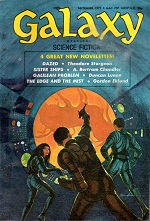Dazed
- by Theodore Sturgeon
- Short Story
- Science Fiction
- Adults
- Definite Time Travel
- English
- “Dazed” by Theodore Sturgeon, in Galaxy, September/October1971.
In 1950, a 25-year-old man begins to think that his own generation—those who will soon be in charge—are taking the world in an Orwellian direction because of an imbalance that’s occurring, so he writes a personal ad seeking help in rebalancing the world, and he gets an instant answer that, among other things, takes him a few decades into the future.
When he was in Lilliput there was a war between the Lilliputians and another nation of little people—I forget what they called themselves—and Gulliver intervened and ended the war. Anyway, he researched the two countries and found they had once been one. And he tried to find out what caused so many years of bitter enmity between them after they split. He found that there had been two factions in that original kingdom—the Big Endians and the Little Endians. And do you know where that started? Far back in their history, at breakfast one morning, one of the king’s courtiers opened his boiled egg at the big end and another told him that was wrong, it should be opened at the small end! The point Dean Swift was making is that from such insignificant causes grow conflicts that can last centuries and kill thousands. Well, he was near the thing that’s plagued me all my life, but he was content to say it happened that way. What blow-torches me is—why. Why are human beings capable of hating each other over such trifles? Why, when an ancient triviality is proved to be the cause of trouble, don’t people just stop fighting?

Variants
(1)
- “Dazed” by Theodore Sturgeon, in Galaxy, September/October1971.
